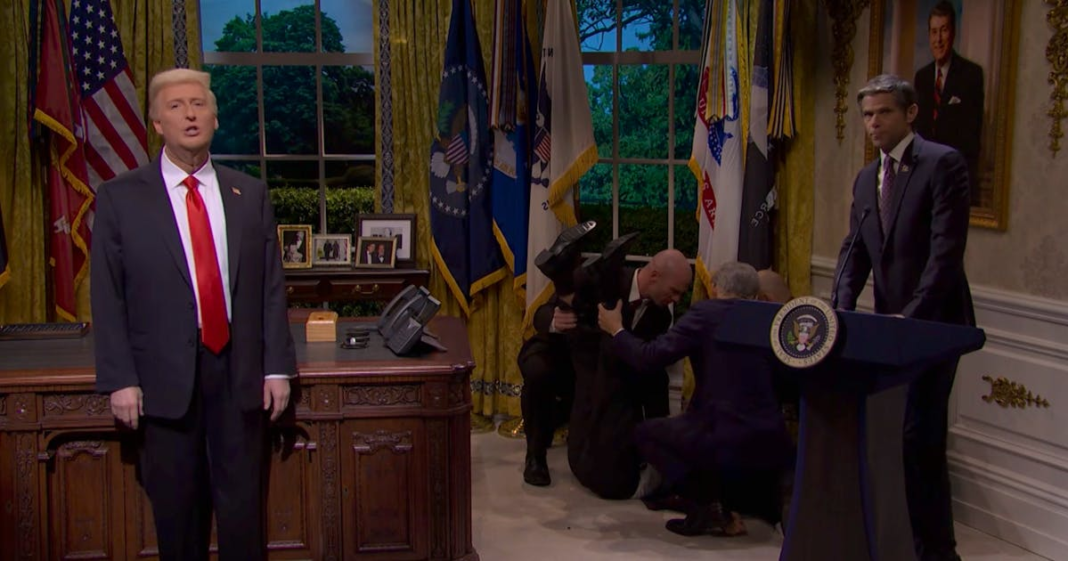The Satirical Spotlight: SNL’s ‘Cold Open’ on Trump and the Pharmaceutical Industry
At precisely 7:26 a.m., the airwaves felt a ripple of anticipation. Last night’s Saturday Night Live showcased a sharp and wry analysis of contemporary political discourse in its “Cold Open” sketch, taking aim at the recent White House meeting involving Donald Trump and pharmaceutical industry representatives. With comedic finesse, the sketch punctured the often heavy atmosphere surrounding political engagements, inviting both laughter and contemplation.
Sketch Breakdown: The Collapse
The sketch humorously mirrored the events of the actual meeting, where at one point, a pharmaceutical representative dramatically collapses. Andrew Dismukes, stepping into the shoes of Robert F. Kennedy Jr., delivers the line “Oh, no” before rushing out of the room with the urgency reminiscent of a scene from a thriller. This moment serves as a clever nod to the irony of political gatherings, where real-life stakes blend seamlessly into the absurdity of satire.
James Austin Johnson as Trump: A Sociopath’s Gaze
James Austin Johnson’s portrayal of Donald Trump steals the spotlight as he embodies the former president with a striking balance of accuracy and caricature. Johnson quips about his performance: “I think I play it quite normally: I stand there and stare like a sociopath.” His depiction accentuates the surreal aspects of Trump’s demeanor, particularly the infamous long tie—a signature look that adds layers to the impersonation. The absurdity escalates when RFK Jr. makes a hasty exit, simulating a near-hysterical reaction to the very thought of vaccination.
Trump’s Comedic Autonomy
As the sketch unfolds, Johnson’s Trump reveals his penchant for extravagant dramatics. “The previous week I had demolished the East Wing of the White House; now a representative of the pharmaceutical industry is almost dying—just for the thought of taking less for medication,” he jests. This line underscores the farcical landscape of political leadership, where hyperbole reigns supreme, captivating audiences while also critiquing the absurdities of governance.
The Media and Political Commentary
Expanding his commentary, Johnson’s Trump tackles media narratives head-on. “There’s a collapse in the White House: who knew it wasn’t me?” he muses, flipping the script on the media’s portrayal of his policies. In a sly jab at public perception, he quips about being misunderstood: “They’re the ones who are smeared: it’s Stephen Miller’s politics. I don’t read that stuff.” Here, the sketch invites viewers to reflect on the dichotomy between reality and media representation, revealing how humor can illuminate critical social issues.
On Election Outcomes and Representation
Continuing with his characteristic nonchalance, Johnson addresses the political scene post-election. When commenting on Zohran Mamdani’s victory, he admits, “I’m divided, because I like winners, but I’m not very enthusiastic about Muslims.” This unsettling line pushes boundaries, showcasing the discomfort that often accompanies political discourse while simultaneously evoking laughter through its audacity.
Food for Thought: Thanksgiving and Ozempic
As the humor deepens, the sketch shifts toward more personal themes, including the economic implications of Thanksgiving. “No one needs to whine that Thanksgiving dinner is too expensive,” he quips, darkly noting, “The good news is, your families can’t come because all the planes are gone. We call that: problem solves a problem.” By juxtaposing holiday traditions with socio-economic realities, the sketch cleverly navigates the complexities of American life, revealing how humor can serve as a coping mechanism for distressing realities.
The Unpredictable Nature of Reality
In a surreal twist, Johnson’s Trump cheekily muses about the fate of his collapsed guest. “He’s got his feet up: That’s called cartoon death. Honestly, don’t tell me if he’s dead, I want to be surprised,” he remarks. This encapsulates the sketch’s blend of absurdity and commentary on the unpredictability of political life, reinforcing the notion that satire often mirrors truth in its exaggeration.
By threading together humor and poignant critiques, SNL’s “Cold Open” serves as a timely reminder of the complexities of political relationships and the often absurd nature of governance. It captures the essence of political satire in a format that is as entertaining as it is reflective, prompting viewers to engage with the deeper questions left in its wake.



